
JOURNAL OF NEMATOLOGY
metrics 2024
Unlocking Nematode Insights for Agricultural Excellence
Introduction
JOURNAL OF NEMATOLOGY, published by the SOC NEMATOLOGISTS, serves as a crucial platform for cutting-edge research in the fields of nematology, agronomy, and crop science. With an ISSN of 0022-300X and an E-ISSN of 2640-396X, this esteemed journal has been an open-access resource since 2016, enabling a wider audience to engage with its findings. The journal is recognized for its high-quality publications, currently holding a Q2 ranking in Agronomy and Crop Science as per the 2023 category quartiles. With a Scopus rank of #171 out of 406 in Agricultural and Biological Sciences, it occupies a vital position in disseminating knowledge crucial for advancing research and practices related to nematodes and their impact on crop productivity. The JOURNAL OF NEMATOLOGY aims to foster collaboration among researchers, professionals, and students, ultimately contributing to the sustainability and productivity of agricultural systems.
Metrics 2024
 0.46
0.46 1.40
1.40 1.50
1.50 69
69Metrics History
Rank 2024
Scopus
IF (Web Of Science)
JCI (Web Of Science)
Quartile History
Similar Journals
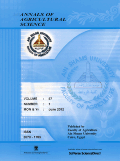
ANNALS OF AGRICULTURAL SCIENCES
Connecting Research and Practice for Global Agricultural AdvancementANNALS OF AGRICULTURAL SCIENCES, published by Elsevier, stands as a leading open access journal dedicated to the multifaceted field of agricultural sciences. Since its inception in 2011, this journal has served as a pivotal platform for the dissemination of high-quality research, covering areas such as agronomy, animal science, horticulture, food science, plant science, and soil science. With an impressive Q1 ranking across multiple disciplines and notable positions in Scopus Ranks—including #6 in Animal Science and Zoology and #3 in Horticulture—this journal is recognized globally for its significant contribution to advancing agricultural innovations. The journal caters to a diverse audience of researchers, professionals, and students, providing them with open access to cutting-edge studies that address critical issues in agricultural productivity and sustainability. Its commitment to high-impact research ensures that articles contribute meaningfully to the scientific community, fostering advancements in agricultural practices and policies.

Revista de la Facultad de Agronomia de la Universidad del Zulia
Advancing Agronomy: Bridging Research and PracticeWelcome to the Revista de la Facultad de Agronomia de la Universidad del Zulia, a key publication in the fields of Agronomy, Animal Science, Food Science, and Plant Science. Published by the Facultad de Agronomía, Universidad del Zulia, this journal aims to foster academic dialogue and disseminate impactful research that advances knowledge and practice within these disciplines. Operating under the ISSN 0378-7818 and E-ISSN 2477-9407, this journal offers a platform for both emerging and established scholars to share their discoveries and innovations. Despite its challenges, as reflected in its Q4 ranking across multiple categories in 2023, it remains a vital resource for the Venezuelan scientific community and beyond. Readers will benefit from a diverse array of studies and discussions that address contemporary issues in agriculture and related fields, helping inform best practices and policy. Engage with cutting-edge research from Venezuela and contribute to the development of agronomic sciences in the region.

ACTA AGROBOTANICA
Exploring the depths of plant science and ecology.ACTA AGROBOTANICA, published by Polskie Towarzystwo Botaniczne, serves as a premier open-access journal in the fields of Agronomy, Ecology, and Plant Sciences. Established in 1953, this journal presents a rich history of scholarly contributions, showcasing significant research findings and advances within the botanical domain. Operating under an Open Access model since its inception, ACTA AGROBOTANICA fosters accessibility and dissemination of knowledge, crucial for researchers, professionals, and students alike. The journal currently holds a respectable Q3 ranking in prominent categories such as Agronomy and Crop Science, Ecology, Evolution, Behavior and Systematics, and Plant Science as of 2023, reflecting its growing impact within the scientific community. With a dedication to exploring diverse botanical issues in Poland and beyond, this journal remains a valuable platform for innovative research and critical discourse in botany.
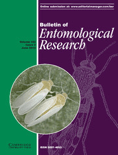
BULLETIN OF ENTOMOLOGICAL RESEARCH
Fostering Interdisciplinary Dialogues in Entomological ResearchBULLETIN OF ENTOMOLOGICAL RESEARCH, published by Cambridge University Press, is a prestigious journal that has been at the forefront of entomological research since its inception in 1910. With an impressive track record extending through to 2024, this journal serves as a vital platform for advancing knowledge in various related fields, notably Agronomy and Crop Science and Insect Science, where it ranks in the top quartile (Q2) and maintains a commendable position within the Scopus rankings in its categories. Notably, its contributions also intersect with Medicine in a broader scope, fostering interdisciplinary insights. While access to the journal content is not classified as 'Open Access,' its rigorous peer-reviewed articles are crucial for researchers, professionals, and students seeking to enhance their understanding of entomology and its applications in agronomy and beyond. The journal's impact is reflected in its notable percentile rankings, emphasizing its relevance and influence in the academic community. Located at the heart of the UK, the BULLETIN OF ENTOMOLOGICAL RESEARCH continues to be an essential resource for those dedicated to the study and understanding of insects and their impacts on agriculture and health.
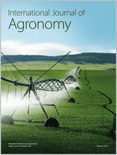
International Journal of Agronomy
Cultivating Knowledge to Transform AgronomyIntroducing the International Journal of Agronomy, an influential publication in the field of agricultural sciences, established by HINDAWI LTD. With an impact factor that reflects its relevance and quality, this journal has been an essential resource for researchers and professionals since its shift to Open Access in 2009, facilitating widespread dissemination of knowledge. Based in the United States, the journal has achieved notable recognition within the academic community, currently ranked in the Q2 quartile among Agronomy and Crop Science, with an impressive Scopus Rank of #139 out of 406 in its category, representing the top 65th percentile. Spanning from 2013 to 2024, it aims to advance the understanding and innovation in agronomy through its rigorous peer-reviewed research articles, reviews, and case studies. With a commitment to enhancing global agricultural practices and sustainability, the International Journal of Agronomy stands as a vital platform for sharing cutting-edge findings that ultimately contribute to the advancement of the agronomic sciences.
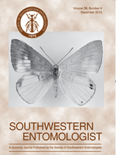
SOUTHWESTERN ENTOMOLOGIST
Innovating Solutions through Entomological ResearchSOUTHWESTERN ENTOMOLOGIST is a pivotal academic journal dedicated to advancing the fields of Agronomy, Ecology, and Insect Science. Published by the SOUTHWESTERN ENTOMOLOGICAL SOC in the United States, this journal plays a crucial role in disseminating vital research findings that address pressing ecological and agricultural challenges. With its ISSN 0147-1724 and E-ISSN 2162-2647, the journal has been publishing comprehensive studies since 1993 and continues to contribute significantly to the knowledge base up to 2024. As a Q4 ranked journal in both Agronomy and Crop Science and Ecology, as well as Insect Science, it provides an inclusive platform for researchers and students to share their insights and foster collaborations. Although it currently does not offer open access options, the content is accessible to academic institutions and professionals, ensuring that significant findings reach a broad audience. Given its niche focus, SOUTHWESTERN ENTOMOLOGIST not only appeals to researchers and students but also to professionals looking to stay updated on the latest trends and developments in entomology and its related fields.

Zemdirbyste-Agriculture
Harvesting insights for a resilient agricultural landscape.Zemdirbyste-Agriculture is a prominent journal dedicated to advancing the field of agricultural sciences, with a particular focus on agronomy and crop science. Published by the Lithuanian Research Centre Agriculture & Forestry, this open access journal has been fostering knowledge sharing and scientific discourse since 2004, allowing researchers, professionals, and students unrestricted access to its content. Located in the beautiful country of Lithuania, specifically at Vytautas Magnus University, this journal plays a significant role in disseminating innovative research findings. With a 2023 Scopus ranking of #246 out of 406 in the category of Agricultural and Biological Sciences, Zemdirbyste-Agriculture falls within the Q3 quartile, reflecting its growing influence in the academic community. This journal, which has converged its publication focus from 2008 to 2023, aims to provide a platform for scientists to share their critical insights on agricultural practices, sustainability, and technological advancements in crop science, thereby contributing to the global discourse on food security and environmental health.

Bioagro
Delivering insights to shape the future of agriculture and biology.Bioagro is an esteemed academic journal dedicated to advancing research in the field of Agricultural and Biological Sciences. Published by the University Centroccidental Lisandro Alvarado in Venezuela, this journal has made significant strides since its inception in 2008, with a focus on delivering high-quality research publications that address contemporary challenges in agriculture and biology. Recognized for its contributions, it holds a Q3 ranking in the Agricultural and Biological Sciences (miscellaneous) category as of 2023, and it ranks #125 out of 221 in its field, placing it in the 43rd percentile. Although it operates on an Open Access model, Bioagro strives to provide broad access to innovative research, thereby fostering collaboration and knowledge dissemination among researchers, professionals, and students. With a commitment to include a wide range of topics, the journal aims to be a pivotal platform for exploration and dialogue in agricultural sciences, ensuring that key findings reach both scientific and practitioner audiences. Located in Barquisimeto-Cabudare, Lara, Venezuela, Bioagro invites submissions that contribute to the global discourse on sustainable practices and innovations in agriculture.
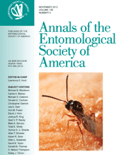
ANNALS OF THE ENTOMOLOGICAL SOCIETY OF AMERICA
Advancing the Frontiers of Insect ScienceANNALS OF THE ENTOMOLOGICAL SOCIETY OF AMERICA is a premier journal dedicated to advancing the field of insect science, published by Oxford University Press. With an impressive impact factor and classified in the Q1 quartile for its category, this journal ranks among the top publications in agricultural and biological sciences, specifically within insect science, positioned at #28 out of 181, indicating its significant influence and high-quality research contributions. The journal aims to disseminate original research, comprehensive reviews, and groundbreaking findings that enhance our understanding of entomology, spanning across ecological, evolutionary, and applied segments. With a consistent publication history since 1938, researchers, professionals, and students will benefit from the wealth of knowledge presented in its pages. Although the journal does not currently offer open access, it remains a vital resource for those seeking to stay at the forefront of entomological research and innovation.

NEMATOLOGY
Elevating the Discourse on Nematodes and Their RolesNematology is a prominent journal published by BRILL, focusing exclusively on the multifaceted realm of nematodes and their ecological, agricultural, and biological implications. With an ISSN of 1388-5545, this esteemed journal serves as a vital platform for researchers, professionals, and students dedicated to advancing knowledge in Agronomy and Crop Science and Ecology, Evolution, Behavior, and Systematics. Established in 1999 and continuing its mission until 2024, Nematology holds a Q2 ranking in Agronomy and Crop Science and a Q3 ranking in Ecology as of 2023, indicating its significant impact within these fields. Published in the Netherlands, this journal is accessible through various options, providing vital insights into nematological research and its applications. Researchers from around the globe are encouraged to explore, submit manuscripts, and contribute to the evolving discourse within this specialized yet pivotal area of study.